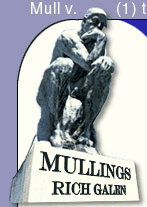

Unfairness Doctrine
Wednesday June 27, 2007
Click here for an Easy Print Version
New Feature!
Check out the new Mullings Blog.
You really should take a look.
There's some good stuff there.
Sen. Diane Feinstein (D-Ca) said on Sunday that she thought it would be a good idea if the Congress would pass a law bringing back what used to be known as "The Fairness Doctrine."
It is a perfectly horrid idea.
Dear Mr. Mullings:
"Perfectly horrid?" What, did you recently watch The Princess Bride or something?
Signed,
The National Association of Thursday Night Bowling Leagues
Ok. Not "perfectly horrid." How about �
That's an idea that stinks out loud.
Not perfect, but better. Much better.
On Fox News Sunday this past weekend, Feinstein, according to Broadcasting & Cable Magazine said that "talk radio is one-sided and 'explosive.' She said it 'pushes people, I think, to extreme views without a lot of information.'"
Which sounds much like she's describing the Senate Floor debate on the immigration bill, but maybe that's just me.
The basic law covering the use of radio waves in the United States - including everything from radar to your local disc jockey - is built on the Communications Acts of 1934 and 1937 which, in turn, were based on the Radio Act of 1927.
Part of those laws included Section 315 which provided for equal time - or more precisely - equal opportunity for all legally qualified candidates for public office.
This was back in the time when newspapers were openly partisan. It was not at all unusual to have one newspaper in Upper Iguana named the UI Democrat; and another named the Republican Iguanian. And they really were partisan.
Because there are a finite number of licenses available for AM, FM and Television broadcasting it was decided that if a radio station made time available for sale to candidate A in the race for City Council, it had to make the same amount of time available at the same rates to Candidate B.
If Candidate B was underfunded, there was no requirement that the station give him time to match what Candidate A bought; merely that Candidate B have the same opportunity.
According to the Museum of Broadcast Communications:
The Federal Communications Commission took the view, in 1949, that station licensees were "public trustees," and as such had an obligation to afford reasonable opportunity for discussion of contrasting points of view on controversial issues of public importance.
In the way of Washington, the FCC later determined that it was not enough to afford reasonable opportunities for such discussions, but the stations had an obligation to "actively seek out issues of importance to their community and air programming that addressed those issues."
This was not a law but a regulation of the FCC. Came the Reagan era and deregulation was all the rage. On of the regulations which was dee'd was the Fairness Doctrine.
Twice Democrat-controlled Congress tried to pass a law re-establishing the Fairness Doctrine, twice it was vetoed - once by President Reagan and once by President George H.W. Bush.
The realities of broadcasting are: The market tends to work. If a local radio station thinks it will get better ratings (more people listening, hence higher ad rates, hence more income) by airing Rush Limbaugh, then will rush Rush to air.
If it thinks it will make its numbers by airing Air America, then it is free to do that.
The Fairness Doctrine would, in effect, require a station airing Limbaugh to air a Liberal talk show for the same amount of time. There is no requirement on the listeners to hang around, however, so it is likely that higher ad rates will be paid for Limbaugh than for Ben Mankiewicz on Air America.
Who?
Exactly.
It is true that there are a finite number of broadcast licenses. It is also true that with 1,873 cable channels on TV and XM/Sirius satellite radio there is no shortage of choices for Americans who want to watch or listen to news or what passes for news.
It is also true that there are a finite number of hours in the day and forcing Americans to listen to or watch programming in which they have no interest - because people in Congress think they know what's best - is what's worst.
Since the end of the Fairness Doctrine Democrats have controlled the House of Representatives for about 15 years, Republicans for 12. The Senate is even closer.
Sounds pretty fair to me.
Once again, the Congress thinks it has a solution and is looking for a problem to fit it.
On a the Secret Decoder Ring page today: Lot's o' links: The Fairness Doctrine, the Equal Time Rule, Sen. Feinstein's appearance, and Air America. An eagle-eyed Mullfoto and a Catchy Caption of the Day.
And a link to the new Mullblog!.
--END --
Copyright © 2007 Barrington Worldwide, LLC
Become a
Paid Mullings Subscriber!
(To join the FREE mailing list or to unsubscribe Click Here)

Current Issue |
Secret Decoder
Ring | Past
Issues | Email
Rich | Rich
Who?
Copyright �2006 Richard
A. Galen | Site design by Campaign
Solutions. |





 US & Int'l Papers
US & Int'l Papers